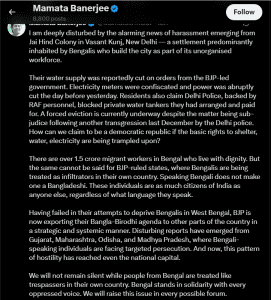New Delhi – The Jai Hind Camp New Delhi has become the center of a significant controversy following the disconnection of electricity and water supply to thousands of residents. The action, executed on Tuesday, was carried out under court orders citing illegal connections, affecting one of Delhi’s largest settlements of domestic and sanitation workers.
The Jai Hind Camp New Delhi situation has escalated into a political dispute, with West Bengal Chief Minister Mamata Banerjee strongly criticizing the Delhi government’s actions. The camp, located in Masoodpur Village in southwest Delhi near Vasant Kunj, houses thousands of workers, predominantly from West Bengal, who have been living there for over a decade.
Legal Background and Court Proceedings
The Jai Hind Camp New Delhi case stems from a legal dispute between 30 landowners and the occupants who have established settlements on the property. According to police sources, the residents have been living with illegal electricity and water connections for more than ten years, leading to the current legal confrontation.
A July 2024 order from the Patiala House Court specifically directed the disconnection of electricity connections, removal of electricity meters and wires from the Jai Hind Camp New Delhi area. The court order was issued following allegations by landowners that occupants had illegally set up jhuggis and obtained utility connections in their names.
Official documentation reveals that the Jai Hind Camp New Delhi property is illegally occupied by more than 1,000 jhuggis, with execution warrants requiring implementation before the scheduled hearing date of July 9, 2024. A letter from the Vasant Kunj Police Station SHO dated August 1, 2024, confirms these details.
Implementation and Security Measures
The disconnection operation at Jai Hind Camp New Delhi was carried out jointly by the Delhi Jal Board and BSES under heavy security deployment. Police provided security coverage to ensure the utility disconnection process proceeded without law and order disturbances.
DCP (Southwest) Amit Goel confirmed that police acted in compliance with court orders, working with other parties involved in the case. The security arrangements at Jai Hind Camp New Delhi were implemented to prevent any potential conflicts during the utility disconnection process.

Senior police officers emphasized that the action was mandatory following the court directive, leaving authorities with no choice but to execute the disconnection orders at the Jai Hind Camp New Delhi settlement.
Resident Demographics and Social Impact
The Jai Hind Camp New Delhi primarily houses domestic workers and sanitation workers, with a significant majority originating from West Bengal. These workers form an essential part of Delhi’s informal economy, providing crucial services to the city’s residents.
The demographic composition of Jai Hind Camp New Delhi reflects the broader pattern of interstate migration for employment opportunities. Many residents have established their livelihoods in Delhi while maintaining strong connections to their home state of West Bengal.
Long-term residents of Jai Hind Camp New Delhi have built their lives around the settlement, with some families living there for over two decades. The sudden utility disconnection has created significant hardship for these working-class families.
Resident Reactions and Protests
The utility disconnection at Jai Hind Camp New Delhi has triggered protests from affected residents who view the action as unjust. Fatima Sheikh, a resident who has lived in the settlement for more than 20 years, expressed frustration about the ongoing harassment and deportation of neighbors.


According to Sheikh, residents of Jai Hind Camp New Delhi have faced regular police verification of documents every two months since December. The recent utility cuts represent an escalation in the pressure faced by the settlement’s inhabitants.
The protests highlight the residents’ concerns about their uncertain legal status and the impact on their daily lives. Many Jai Hind Camp New Delhi residents depend on these basic utilities for their survival and ability to continue working in Delhi.
Political Controversy and Interstate Tensions
West Bengal Chief Minister Mamata Banerjee has strongly criticized the actions taken against Jai Hind Camp New Delhi residents, attributing the utility cuts to the BJP-led government’s policies. Her criticism has elevated the issue to a political level, involving interstate relations.


Banerjee’s statement on social media platform X highlighted her concerns about the treatment of Jai Hind Camp New Delhi residents, describing the actions as forced eviction despite the matter being sub-judice. She specifically mentioned the abrupt power cuts and confiscation of electricity meters.
The political dimension of the Jai Hind Camp New Delhi controversy reflects broader tensions between different state governments and their approaches to managing interstate migration and informal settlements.
Legal Procedures and Future Hearings


The Jai Hind Camp New Delhi case is scheduled for hearing on July 18, according to police sources. This upcoming hearing will determine the next steps in the legal dispute between landowners and occupants.
The legal proceedings surrounding Jai Hind Camp New Delhi involve complex issues of property rights, illegal occupation, and the provision of basic utilities to informal settlements. The court’s decision will have significant implications for the thousands of residents affected.
Legal experts suggest that the Jai Hind Camp New Delhi case represents broader challenges faced by Indian cities in managing informal settlements and providing basic services to marginalized populations.
Broader Implications for Urban Planning


The Jai Hind Camp New Delhi situation highlights the challenges faced by Indian cities in managing informal settlements and providing basic services to migrant workers. The case raises questions about urban planning, affordable housing, and the rights of informal settlers.
The controversy surrounding Jai Hind Camp New Delhi reflects the complex intersection of legal, social, and political issues in urban India. The resolution of this case may set precedents for similar situations across the country.
Conclusion and Ongoing Developments
The Jai Hind Camp New Delhi controversy continues to evolve as legal proceedings progress and political tensions escalate. The case exemplifies the challenges faced by migrant workers in Indian cities and the complex legal issues surrounding informal settlements.
The upcoming court hearing on July 18 will be crucial in determining the fate of thousands of residents and the future of this significant settlement in Delhi’s urban landscape.

